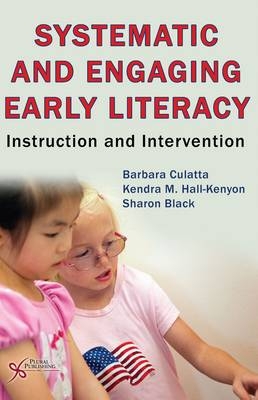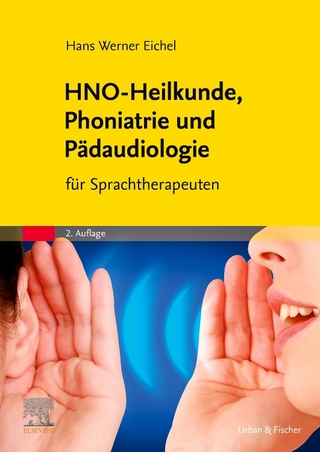
Systematic and Engaging Early Literacy
Plural Publishing Inc (Verlag)
978-1-59756-345-1 (ISBN)
This text provides teachers, speech-language pathologists, and others working with young children with methods for providing systematic and engaging literacy instruction. The approaches it treats are evidence based, being examined and refined by classroom implementation. They cover the array of important early literacy and language skills, both print based and meaning based (phonological awareness, print awareness and letter knowledge, story comprehension and vocabulary, and oral and written language). In a casual style and tone, easily accessible to a wide variety of readers, each chapter presents underlying research, applied principles, and illustrations of a variety of contexts and activities for instructional purposes. Ideas for school-home connections are included as well.While there are a number of texts that focus on emergent and early literacy curriculum (defining curricular components and developmental progression), assessment, and instructional delivery models, this book contains innovative content not found elsewhere, including: Strategies and procedures for coordinating class-wide literacy instruction and activities with supplemental literacy services provided by support personnel Specific ways to use paraeducators and parent or community volunteers to increase instructional opportunities Procedures for conducting effective professional development Integrated arts curriculum and procedures Mechanisms for embedding literacy learning in all classroom contexts with varied participant structures in order to provide intense and frequent opportunities for children to practice literacy skills Primarily targeted at early childhood educators and speech-language pathologists at preservice and practicing professional levels, the content will also be relevant to any education professionals involved with literacy instruction in early childhood settings, including reading specialists, special educators, and teachers of English as a second language.
The book is also appropriate for undergraduate or graduate level classes dealing with early language and literacy instruction or with intervention in early childhood education, speech-language pathology, or special education programs.
Barbara Culatta, PhD Dr. Barbara Culatta is a Professor of Communication Disorders and Associate Dean of the McKay School of Education at Brigham Young University. She received her PhD from the University of Pittsburgh and completed a postdoctoral fellowship from Johns Hopkins University. She has written a book entitled Language and Literacy Instruction in the Classroom and numerous book chapters and publications on language and literacy instruction. She has directed early literacy and intermediate grade literacy instructional projects. Dr. Culatta has conducted federally-funded literacy projects in Spanish and English in Head Start and public school settings and was awarded research and training grants in early language intervention and collaborative-based language and literacy instruction. Her research evaluates the effectiveness of language intervention procedures for improving children's academic functioning. She relies on play, story enactment, hands-on experiences, and instructional conversations as contexts for enhancing language and literacy skills in young children. Kendra Hall-Kenyon, PhD, is Assistant Professor in the Department of Education at Brigham Young University. Sharon Black is a writing consultant and editor at the David O. McKay School of Education. She is also an Associate Teaching Professor in the English Department at Brigham Young University. She has held this position since 1992.
Chapter 1. Laying Foundations: Principles and Practices to Guide Early Literacy Programs Sharon Black Chapter 2. Dynamic Systems Theory Applied to Language and Literacy Learning Carol Westby Chapter 3. Learning What Print Means: Print Awareness in School, Home, and Community Sharon Black Chapter 4. Exploring Squiggles on Paper: Teaching and Practicing Letter Knowledge Skills Gary Eldon Bingham, Sharon Black, and Barbara Culatta Chapter 5. Recognizing and Manipulating Sounds: Phonological and Phonemic Awareness Kendra M. Hall-Kenyon and Barbara Culatta Chapter 6. Putting Letters and Sounds Together: Phonics and Decoding Strategies Barbara Culatta, Kendra M. Hall-Kenyon, and Sharon Black Chapter 7. Using Sounds and Letters to Form Words: Developmental Spelling Kendra M. Hall-Kenyon, Ann C. Sharp, and Brenda L. Sabey Chapter 8. Bringing Stories to Life: Approaches to Understanding and Enjoying Narratives Barbara Culatta, Kendra M. Hall-Kenyon, and Sharon Black Chapter 9. Learning About the World: Exploring and Comprehending Expository Texts Sharon Black, Kendra M. Hall-Kenyon, and Barbara Culatta Chapter 10. Working with Parents: Ways to Involve Parents in Early Literacy at Home and at School Gary Eldon Bingham, Byran Korth, and Esther Marshall Chapter 11. Enriching Language and Literacy: Integrating Visual Arts, Music, Dance, and Drama Sharon Black Chapter 12. Assessing Students' Needs and Progress: Use of Data to Adjust Instruction Barbara Culatta and Kendra M. Hall-Kenyon Chapter 13. Learning and Improving Together: Collaborative Professional Development John Wilkinson and Barbara Culatta Chapter 14. Applying Systematic and Engaging Practices: Planning Units and Lesson Activities Kendra M. Hall-Kenyon and Barbara Culatta
| Zusatzinfo | b/w illustrations |
|---|---|
| Verlagsort | San Diego |
| Sprache | englisch |
| Maße | 152 x 229 mm |
| Gewicht | 612 g |
| Themenwelt | Medizin / Pharmazie ► Gesundheitsfachberufe ► Logopädie |
| Sozialwissenschaften ► Pädagogik ► Schulpädagogik / Grundschule | |
| ISBN-10 | 1-59756-345-5 / 1597563455 |
| ISBN-13 | 978-1-59756-345-1 / 9781597563451 |
| Zustand | Neuware |
| Haben Sie eine Frage zum Produkt? |
aus dem Bereich


